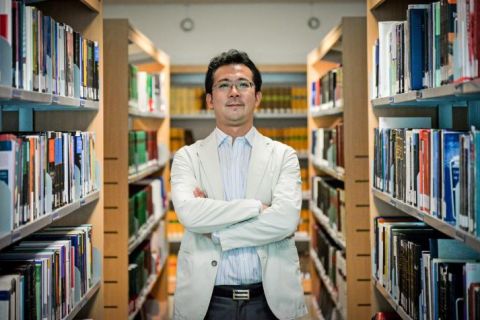
SMU Assistant Professor Liu Yanju examines how economic agents make decisions when faced with the choice of behaving ethically or increasing their financial gain.

Photo Credit: Cyril Ng
By Rebecca Tan
SMU Office of Research (15 Jul 2014) – The 2008 financial crisis sent the global economy into a tailspin, forcing governments to resort to expensive bailouts to keep their economies afloat. Taxpayers responded with a mixture of confusion and outrage – flabbergasted by how “creative accounting” practices could be considered legal, and angered by fat cat bankers’ generous compensation packages as the retirement savings of average investors were being wiped out.
Although many reasons have been put forward to explain the development of what is widely believed to be the worst financial crisis since the Great Depression in the 1930s, one of the key issues at the heart of this crisis was the fundamental contradiction between private and social interests. Private interests naturally seek to maximise profits, while social interests are concerned about non-financial incentives such as social good and ethical outcomes. In this case, profit maximising behaviours clearly have trumped ethical practices.
In her research, Assistant Professor Liu Yanju, from the Singapore Management University (SMU) School of Accountancy quantifies how private and social interests interact, and the conditions under which one interest can take precedence over the other.
“My research interests focus on how social norms and financial incentives work together in shaping financial market participants’ behaviour,” she says. “I feel that it would be interesting to explore whether ‘money talks’ when market participants are faced with the dilemma of choosing between social norms and financial rewards.”
‘Sin’ products are shunned, but not always
In order to study how the two different motivations influence the behaviour of economic agents, Professor Liu first had to determine a way of measuring social norms. Measuring social norms, which are the standards that guide and constrain social behaviour, is particularly challenging as social norms reported in surveys may not correlate well with actual behaviour.
Focusing on the ‘sin’ industries of tobacco, alcohol and gaming, Professor Liu adopted a unique approach to estimating social acceptability: using consumption as a proxy for social acceptance. This approach provided her with a direct empirical measure of social norms, as consumption of ‘sin’ products closely matched their social acceptability.
Together with collaborators from the University of Toronto and McMaster University, Professor Liu then correlated the consumption of ‘sin’ products with the amount of investment from institutional investors, and the level of coverage by financial analysts – both of which are publicly available data. The study was recently been published in the journal Accounting, Organizations and Society.
“In agreement with previous research, we found that companies who make their money in the ‘sin’ industries such as the tobacco, alcohol and gaming industries do indeed receive less attention from institutional investors and financial analysts. This showed that social norms typically dominate, leading economic agents to shun ‘sin’ industries.
“However, our research also showed that social norms and attitudes towards these types of businesses were compromised when their stocks performed well. We found that institutional shareholdings and analysts' coverage of ‘sin’ firms correlated with the performance of these firms. In other words, coverage of these firms increased with rising performance expectations. This implied that market participants may ignore social norms and standards when the expected financial rewards are high,” she explains.
Regulation in the face of changing norms
“Based on our findings, one can argue that some ethical standards consistent with corporate social responsibility considerations are not necessarily profitable to follow. This creates a gap between what is right to do (following ethical standards) versus what is profitable to do (investment practices),” Professor Liu says.
An implication of her finding that social norms can be compromised is that there is a greater need for regulation and law, even if it comes at a cost.
“Extending our findings to a more general context, one may predict that when existing social norms are interacted with a strong counteracting force, such as financial considerations, a real risk exists that these compromises become part of acceptable future social norms,” she observes.
“A compromised set of social norms may result in the need for regulations and laws to be enforced to maintain social order. Such was the case in 2002 when auditing firm Arthur Andersen was convicted of criminal charges for destroying documents related to the Enron scandal. However, the implementation and enforcement of such laws can be extremely expensive and difficult, as was seen in the subsequent passing of the Sarbanes-Oxley Act.”
Apart from the overlap with company accounting laws, Professor Liu’s research could also have implications in fields such as economics, finance and sociology. Seeing the potential for synergy with her own field of research, she hopes to collaborate with colleagues from different schools at SMU.
“The impact of social norms on the labour market was first studied in economics literature in the 1980s. Both social science and finance literature has also documented that social norms are important in shaping economic behaviour and market outcomes. The approach that I have developed has much to contribute to these areas,” she notes.
Is “green” good enough?
Approaching social norms positively instead of negatively as in the ‘sin’ industries, Professor Liu is now studying whether ‘green’ companies, which emphasise environmentally friendly and sustainable processes, attract more institutional investment and analyst following than non-‘green’ companies.
“My co-authors and I are currently working on exploring whether companies benefit from doing good to society. In addition to studying whether adherence to positive social norms correlates with financial rewards, we also examine whether the benefit of being ‘green’ is sacrificed when the financial returns are low,” she says.
What has been personally encouraging for her is the increased awareness of the need for business practices that are both ethical and ‘green’, and how the public is making its voice heard on these issues.
“If consumers themselves become increasingly savvy and demand that businesses conform more closely to societal standards, then it becomes profitable to abide by social norms. In this way, the gap between private and social interests grows smaller. This is one way other than stricter regulations that could help us avoid the next big financial crisis,” she concludes.
See More News
Want to see more of SMU Research?
Sign up for Research@SMU e-newslettter to know more about our research and research-related events!
If you would like to remove yourself from all our mailing list, please visit https://eservices.smu.edu.sg/internet/DNC/Default.aspx

